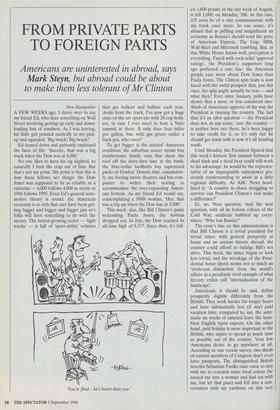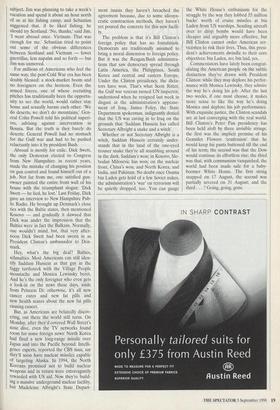FROM PRIVATE PARTS TO FOREIGN PARTS
New Hampshire A FEW WEEKS ago, I drove over to see my friend Ed, who does something on Wall Street involving getting up early and down- loading lists of numbers. As I was leaving, his little girl pointed excitedly to my pick- up and squealed, 'Big twuck! Big twuck!'
Ed leaned down and patiently explained the facts of life: 'Sweetie, that was a big truck when the Dow was at 4,000.'
No one likes to have his rig slighted, so naturally I beat the crap out of him. But that's not my point. My point is that this is how these fellows see things: the Dow Jones was supposed to be as reliable as a calendar — 6,000 follows 4,000 as surely as 1996 follows 1995. Even Ed's general auto- motive theory is sound: the American economy is so rich that cars have been get- ting bigger and bigger and bigger just so's folks will have something to do with the money. The fastest-growing sector — 'light trucks' — is full of 'sport-utility' vehicles that get bulkier and bulkier each year. Aside from the truck, I've now got a huge state-of-the-art sport-ute with 28 cup-hold- ers, in case I ever need to host a Nato summit in there. It only does four miles per gallon, but, with gas prices under a buck per, who cares?
To get bigger is the natural American condition: the suburban soccer moms buy cumbersome family vans that shear the roof off the drive-thru lane at the bank; the blue-collar lardbutts buy supersized packs of Dunkin' Donuts that, cumulative- ly, are forcing movie theatres and bus com- panies to widen their seating to accommodate the ever-expanding Ameri- can bottom. As my friend Ed would say, contemplating a 300lb woman, 'Hey, that was a big ass when the Dow was at 5,000.'
This week, alas, like Bill Clinton's pants welcoming Paula Jones, the bottom dropped out. In July, the Dow reached its all-time high of 9,337. Since then, it's fall- You're fired - he's better than you.' en 1,800 points; in the last week of August, it fell 1,000; on Monday, 500. At this rate, it'll soon be of a size commensurate with my truck once more. In one sense, it's absurd that as piffling and insignificant an economy as Russia's should send the price of American Express, The Gap, IBM, Wall-Mart and Microsoft tumbling. But, as this White House knows well, perception is everything. Faced with rock-solid 'approval ratings', the President's supporters long ago perfected a cute line: the American people care more about Dow Jones than Paula Jones. The Clinton spin team is now faced with the awful prospect that, just this once, the spin might actually be true — and what then? Ever since January, polls have shown that a more or less consistent two- thirds of Americans approve of the way the President is running the country. The fact that it's an idiot question — the President does not, in any sense, 'run' the country is neither here nor there: he's been happy to take credit for it, so it's only fair he should get stuck with it now it's all heading south.
Until Monday, the President figured that this week's historic first summit between a dead duck and a dead bear could still work to his advantage: he would be the represen- tative of an impregnable superpower gra- ciously condescending to assist in a little regional difficulty. As ABC News head- lined it: 'A country in chaos struggling to survive: can President Clinton's visit make a difference?'
Er, no. Next question. And the next question, with all its forlorn echoes of the Cold War, suddenly bubbled up every- where: 'Who lost Russia?'
The cynic's line on this administration is that Bill Clinton is a trivial president for trivial times: with general prosperity at home and no serious threats abroad, the country could afford to indulge Bill's sex drive. This week, the times began to look less trivial, and the wreckage of the Presi- dential boxer shorts seems not so much an `irrelevant distraction' from the world's affairs as a peculiarly vivid example of what literary critics call 'internalisation of the landscape'.
Americans, it should be said, define prosperity slightly differently from the British. They work harder for longer hours and have substantially less (if any) paid vacation time, compared to, say, the auto- matic six weeks of salaried leave the hum- blest English typist expects. On the other hand, paid holiday is more important to the British, who aspire to spend as much time as possible out of the country. Very few Americans desire to go anywhere at all. According to one recent survey, two-thirds of current members of Congress don't even have passports. The distinguished British novelist Sebastian Faulks once came to stay with me to research some local colour (he turned me into a woman and had sex with me, but let that pass) and fell into a con- versation with my yardman on this very subject. Jim was planning to take a week's vacation and spend it about an hour north of us at his fishing camp, and Sebastian suggested that, if he liked fishing, he should try Scotland. 'No, thanks,' said Jim. I went abroad once. Vietnam. That was enough for me.' Sebastian tried to point out some of the obvious differences between Scotland and Vietnam — fewer guerrillas, less napalm and so forth — but Jim was unmoved.
For millions of Americans who feel the same way, the post-Cold War era has been doubly blessed: a stock-market boom and no foreigners on the horizon. Even the armed forces, one of whose recruiting pitches has traditionally been the opportu- nity to see the world, would rather stay home and sexually harass each other. 'We do deserts, we don't do mountains,' Gen- eral Colin Powell told his political superi- ors, advising against intervention in Bosnia. But the truth is they barely do deserts: General Powell had no stomach for the Gulf war and had to be pushed reluctantly into it by president Bush.
Abroad is mostly for exile. Dick Swett, the only Democrat elected to Congress from New Hampshire in recent years, made the mistake of changing his position on gun control and found himself out of a job. Not far from me, one satisfied gun- owner painted the entire front wall of his house with the triumphant slogan: 'Dick Swett — he lied, he lost.' Last Friday, Dick gave an interview to New Hampshire Pub- lic Radio. He brought up Denmark's close ties with the Baltic states, then mentioned Kosovo — and gradually it dawned that Dick was under the impression that the Baltics were in fact the Balkans. Normally, one wouldn't mind, but, that very after- noon Dick Swett had been sworn in as President Clinton's ambassador to Den- mark.
Hey, what's the big deal? Baltics, schmaltics. Most Americans can still iden- tify Saddam Hussein as that guy in the faggy turtleneck with the Village People moustache and Monica Lewinsky beret. And he's the only foreigner who even gets a look-in on the news these days, aside from Princess Di: otherwise, it's all new cancer cures and new fat pills and new health scares about the new fat pills causing cancer.
But, as Americans are belatedly discov- ering, out there the world still turns. On Monday, after they'd covered Wall Street's nose dive, even the TV networks found room for some foreign news: North Korea had fired a new long-range missile over Japan and into the Pacific beyond. Intelli- gence experts, reported the CBS man, say they'll soon have nuclear missiles capable of targeting Alaska. In 1994, the North Koreans promised not to build nuclear weapons and in return were extravagantly rewarded with US aid. Now they're build- mg a massive underground nuclear facility, but Madeleine Albright's State Depart- ment insists they haven't breached the agreement because, due to some idiosyn- cratic construction methods, they haven't yet poured the concrete for this new facili- ty.
The problem is that it's Bill Clinton's foreign policy that has no foundation. Democrats are traditionally assumed to bring a moral dimension to foreign policy. But it was the Reagan/Bush administra- tions that saw democracy spread through Latin America, the Philippines, South Korea and central and eastern Europe. Under the Clinton presidency, the dicta- tors have won. That's what Scott Ritter, the Gulf war veteran turned UN inspector, understood when he resigned last week in disgust at the administration's appease- ment of Iraq. James Foley, the State Department spokesman, indignantly denied that the US was caving in to Iraq on the grounds that 'Saddam Hussein has called Secretary Albright a snake and a witch'.
Whether or not Secretary Albright is a witch, Saddam Hussein certainly under- stands that in the land of the one-eyed trouser snake they're all stumbling around in the dark. Saddam's won; in Kosovo, Slo- bodan Milosevic has won; on the nuclear front, China's won, and North Korea, and India, and Pakistan. No doubt once Osama bin Laden gets hold of a few Soviet nukes, the administration's 'war' on terrorism will be quietly dropped, too. You can gauge the White House's enthusiasm for the struggle by the way they lobbed 55 million bucks' worth of cruise missiles at bin Laden from US warships. Sending aircraft over to drop bombs would have been cheaper and arguably more effective, but Bill Clinton cannot order American ser- vicemen to risk their lives. Thus, this presi- dent's achievements dwindle to their core objectives: bin Laden, no; bin laid, yes.
Commentators have lately been congrat- ulating the American people on the subtle distinction they've drawn with President Clinton: while they may deplore his perfor- mance with Monica Lewinsky, they admire the way he's doing his job. After the last two weeks, if one must choose, it makes more sense to like the way he's doing Monica and deplore his job performance. With exquisite justice, the Clinton scandals are at last converging with the real world. Bill Clinton's Peter Pan presidency has been held aloft by three invisible strings: the first was the implicit promise of his Gennifer Flowers 'confession' that he would keep his pants buttoned till the end of his term; the second was that the Dow would continue its effortless rise; the third was that, with communism vanquished, the world had been made safe for a baby- boomer White House. The first string snapped on 17 August, the second was partially severed on 31 August; and the third . . . ? Going, going, gone.



























































 Previous page
Previous page